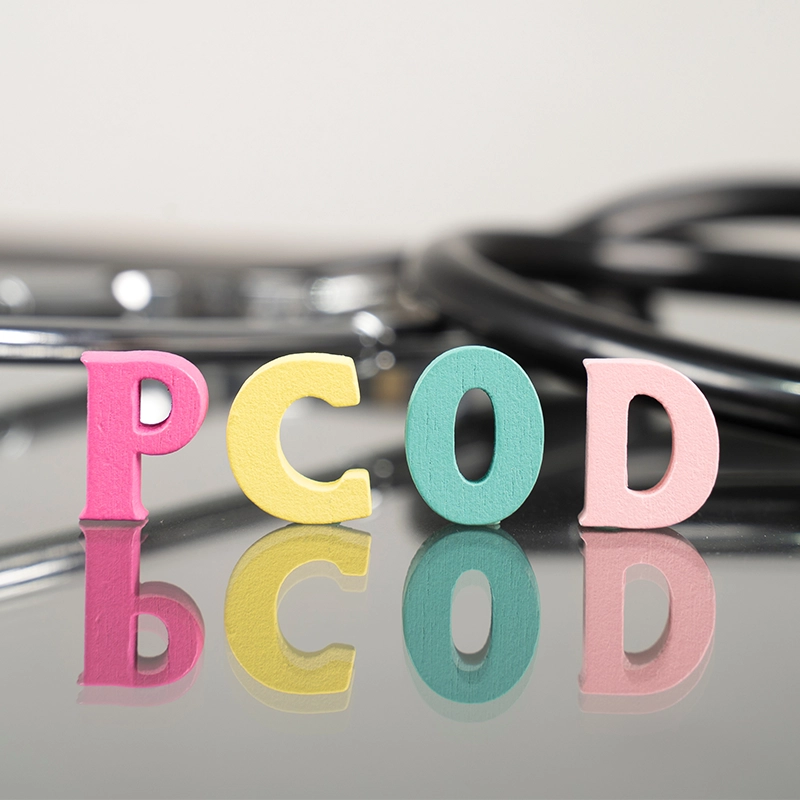
Polycystic Ovary Syndrome (PCOD) is a common and complex hormonal disorder. It can lead to various physical and emotional challenges, from irregular periods to fertility issues and metabolic complications. In this blog, we'll dive into the world of PCOD, exploring its causes, symptoms, management, and lifestyle changes that can help individuals not only cope but thrive with this condition.
Understanding PCOD
Polycystic Ovary Syndrome, often referred to as PCOD or PCOS (Polycystic Ovarian Syndrome), is a hormonal disorder that affects the ovaries. It's characterized by a range of symptoms, and while the exact cause isn't known, several factors contribute to its development:
- Hormonal Imbalance: PCOD is primarily driven by hormonal imbalances. Elevated levels of androgens (male hormones) can lead to irregular menstrual cycles, acne, and excess hair growth.
- Insulin Resistance: Many individuals with PCOD have insulin resistance, which means their bodies have trouble using insulin effectively. This can lead to weight gain and increased risk of Type 2 diabetes.
- Genetics: There's a genetic component to PCOD. If your mother or sister has it, your risk may be higher.
Common Symptoms
The symptoms of PCOD can vary from person to person, but some of the most common include
- Irregular Periods: Women with PCOD often experience irregular menstrual cycles, which may be infrequent or unpredictable.
- Ovulatory Dysfunction: PCOD can lead to the absence of ovulation, making it difficult to conceive for some women.
- Excess Hair Growth: Increased androgen levels may lead to hirsutism, causing excess hair growth on the face, chest, and back.
- Acne and Oily Skin: Hormonal imbalances can result in acne and excessively oily skin.
- Weight Gain: Many women with PCOD struggle with weight gain, particularly around the abdomen.
- Hair Loss: PCOD can lead to thinning hair or male-pattern baldness.
- Skin Darkening: Acanthosis nigricans, a condition where the skin in the body creases darkens, is more common in individuals with PCOD.
Diagnosis
Diagnosing PCOD requires a comprehensive evaluation that includes:
- Medical History: Your doctor will discuss your menstrual history, symptoms, and family history.
- Physical Examination: A physical examination may be performed to check for physical signs of PCOD, such as excess hair growth or acne.
- Blood Tests: Hormone levels, including androgens and insulin, are often measured to assess hormonal imbalances.
- Ultrasound: A pelvic ultrasound is commonly used to examine the ovaries for cysts or other abnormalities.
Management and Treatment
Management of PCOD typically involves a combination of lifestyle changes, medications, and, in some cases, surgical interventions. Here are some key approaches to managing PCOD
- Lifestyle Modifications: Implementing a healthy lifestyle is often the first step in managing PCOD. This includes regular exercise, a balanced diet, and weight management, which can help improve insulin sensitivity and regulate hormonal imbalances.
- Medications: Depending on your specific symptoms, your doctor may prescribe medications to address hormonal imbalances, regulate menstrual cycles, and manage other symptoms. Commonly prescribed medications include birth control pills, metformin, and anti-androgen drugs.
- Fertility Treatments: Women with PCOD who are trying to conceive may benefit from fertility treatments, such as ovulation-inducing medications or in vitro fertilization (IVF).
- Surgical Interventions: In some cases, surgery may be necessary to treat PCOD-related issues, such as ovarian drilling to stimulate ovulation or the removal of ovarian cysts.
Coping with PCOD
Living with PCOD can be challenging, but it's essential to remember that it is a manageable condition. Here are some strategies to cope with PCOD effectively:
- Consult a Specialist: Consult with a healthcare provider who specializes in PCOD. They can provide tailored guidance and treatment options.
- Lifestyle Changes: Embrace a healthy lifestyle with a balanced diet and regular exercise. Even modest weight loss can significantly improve PCOD symptoms.
- Regular Check-ups: Keep up with regular medical check-ups to monitor your progress and make necessary adjustments to your treatment plan.
Conclusion
PCOD is a challenging condition, but it doesn't restrict you. With proper understanding, management, and support, individuals with PCOD can lead healthy, fulfilling lives. Remember, everyone's journey with PCOD is unique. Embrace self-compassion, stay informed, and make choices that nurture your physical and emotional well-being. At Sakra World Hospital, we are dedicated to providing the care and support you need to manage PCOD effectively. Our team of experts is here to guide you on your unique path to well-being.
